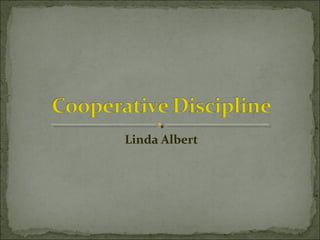
Cooperative Discipline Theory- Linda Albert
- 1. Linda Albert
- 2. “One important tip to remember is that students choose their behavior, and we have power to influence—not control—their choices. The change starts with the teacher; we need to learn how to interact with students so they’ll want to choose appropriate behavior and comply with the rules.”
- 3. 1968- 1972- Teacher in the Public School of Ithica, New York. 1972- 1981- Teacher Specialist in the teacher diagnosis and remediation of behavioral and learning problems. 1978- 1986- Adjunct Professor at Elmira College. 1982- Present- Director of the Family Education Center of Florida in Tampa. She presents workshops, is a spokesperson for parent and teacher education and an educational consultant, has appeared on local and nationally syndicated television programs.
- 4. Her writings include: Coping With Kids 1982 Coping With Your Child's Education(1984, with Elaine Shimbergre) Coping With Kids and Vacation 1986 Strengthening Step Families 1986 Quality Parenting 1987 A Teacher's Guide to Cooperative Discipline: How to Manage Your Classroom and Promote Self Esteem 1989 An Administrators Guide to Cooperative Discipline Strategies for School wide Implementation 1992 Cooperative Discipline(Impress).
- 5. She developed the theory of Cooperative Discipline to help students make better behavior choices. Cooperative Discipline enables teachers to apply specific strategies to reach individual students. She believes that teachers need to learn how to interact with their students so that they'll want to choose appropriate behavior and comply with the rules.
- 6. Step one: Identify student’s behavior: Student’s usually misbehave to reach one of these four goals:
- 7. Attention: They want to be center of attention and this can be gained by: making noises, using foul language, and creating unnecessary interruptions during class time. Power: The student wants to be the boss of the whole classroom, students, and teachers. They will never back down from a argument. Revenge: This will be directed to students or teachers, and could be either physical or emotional revenge. Avoidance of Failure: The students’ feel that they are not smart enough, and cannot live up to the expectations of others. To compensate, they behave in ways that make them appear inadequate, by procrastinating, not completing their work, or pretending to have a disability.
- 8. Attention: Give "the eye" so the student knows you mean business. Stand close to the student and continue your lesson. Distract the student by asking a direct question or using the student’s name while continuing your lesson. Give specific praise to a nearby student who’s on task. Power: Avoid direct confrontation by agreeing with the student or changing the subject. Acknowledge the student’s power and state your actions: "You’re right, I can’t make you finish the math problems, but I’ll be collecting the assignment at the end of the class." Change the activity, do something unexpected, or initiate another class discussion on a topic of interest. Use time-out by giving a choice: "You may sit quietly, keep your hands and feet to yourself, and complete the assignment, or you may go to time-out in Mr. Weber’s room. You decide."
- 9. Revenge: Revoke a privilege, such as not allowing the student to use play equipment. Build a caring relationship by using affirmation statements that give the message: "You’re okay, but your choice of behavior is not." Require the return, repair, or replacement of damaged objects. Involve school personnel or parents if necessary. Avoidance of Failure: Acknowledge the difficulty of the assigned task, but remind the student of past successes he had while doing similar tasks. Modify instruction and materials. Teach the student to say "I can" instead of "I can’t" by recognizing achievements. Provide peer tutors or ask the student to help someone else, perhaps a younger student, to help build self-confidence.
- 10. Capable: Students need to feel capable of completing their work in a satisfactory manner. How? Create an environment where it’s okay to make mistakes. Build confidence by focusing on improvement and on past successes. Make your learning objectives reachable for all students. Connect: Students need to believe they can develop positive relationships with teachers and classmates. How? Be accepting of all students, regardless of past misbehavior. Give attention by listening and showing interest in their activities outside of class. Show appreciation by praise or written notes. Use affirmation statements that are specific and enthusiastic about a student’s good behavior or abilities. Build affectionate relationships with simple acts of kindness. Contribute: Students need to contribute to the welfare of the class so they feel like they make a difference. How? Involve them in maintaining the learning environment by holding class meetings. Ask for suggestions when decisions need to be made. Use cooperative learning groups frequently. Encourage peer tutoring.
- 11. This is designed for parents, students, and teachers to work together. Start with the student by forming a good and positive relationship. Then move to a partnership with the parents. Inform them what you are doing in the classroom and how you are helping their child.
- 12. Spend time chatting with students in the hall after class: Ask students about life outside school. Eat in the cafeteria with the students occasionally. Invite students to share a snack with you in your classroom. Attend school athletic, musical, and theatrical events. Get involved in a community project with your students. Schedule individual conferences to let students know about their progress. Chaperone school events. Make bulletin boards that display student work. Send cards, messages, and homework to absent students. Express real interest in students’ work or hobbies.